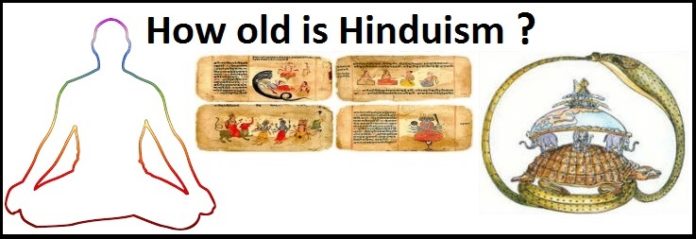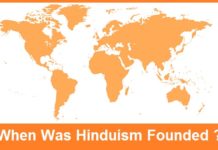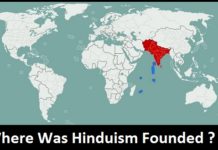The word “religion” has been derived from the word ‘religare’ which means a power to bind or unite people together. The history of Hinduism is a topic of much debate for such reasons and there is no specific answer found for how old is Hinduism. Firstly, it has been said that Hinduism was not there before modern times though it is considered to be one of the ancient religions of ancient India. Secondly, Hinduism is not an actual religion but it embraces several type of traditions. Thirdly, no one is aware about the definite starting point of Hinduism and some practitioners acclaim that the revelation of Hindu was eternal. Religions go back more far than human civilizations.
Since Sanskrit is known as the oldest language to be written down and to be encrypted, hence the Hinduism is to be considered as the oldest religion because the Hindu scriptures are primarily written in Sanskrit. According to western scholars, Rig Veda is the oldest and said to be approximately 3500 years old. Following this, the Hinduism is also 3500 years old if one can accept this.
Related Article : Who is the Founder of Hinduism?
The term Hindu is generally originated from a Persian term which denoted people who lived east and south of the river ‘Indus’. The Persian had suffered a lot while pronouncing ‘Indus’ and they pronounced it as ‘Hindu’. The bull or cow was sacred to the Hinduism religion from the very beginning as archaeologists found many bull-motifs from the Hindu-populated areas. It is said that the religion dates back to 7000BC but does not have any particular founder or a single text. The general belief of Hinduism is that the time is cyclical like four seasons. Texts refer to four ages named golden, silver, copper, and iron respectively.
The history of Hinduism is very difficult to follow up with date certainty but a rough draft can be made about how old is Hinduism. In 1921, the archaeologists found an evidence of an ancient civilization along the Indus River. The Indus-Valley Civilization or Harappan Civilization came into existence on 7000BC and remained up to 2300 or 2000BC covering an area of 75,000miles and traded with Mesopotamia. Many writings have been discovered of this period but they are in a very small in number and are not adequate enough to justify the question how old is Hinduism. There may be a continuation of Indus Valley Civilization and later Hinduism as suggested by the apparent effect of ritual bathing, goddess worshiping and sacrifice among the people. But this is not an accurate reason of beholding the age of Hinduism because these factors are also common like any other religions.
If we get back to the Vedic period, they are united by the Vedic religion which taught them sacrifice and many of the Vedic rituals are still continued in the present day. Sacrifice was generally dedicated to the Vedic Gods who lived in different realms of the universe which was broadly divided into three parts such as earth, atmosphere and sky. The period which began from around the time of Buddha experienced the composition of Dharmasutras and Shastras, the two Epics- Mahabharata, Ramayana and simultaneously The Puranas. Hinduism found their holy religious book ‘Bhagavad Gita’ from the Epic Mahabharata. The idea of ‘Dharma’ includes three basic terms: law, duty and truth. Dharma had become the central idea of Hinduism religion and was recognized by the Dharma Sutras and Shastras. From this period, many basic elements of Hinduism started to be found such as devotion, temple worshiping. The development of deities’ worshiping was experienced by the Hindus in this period.
The medieval period lets us to see the development of great regional temples like The Jagganatha Temple in Puri, the Shiva Temple in Chidambaram, Tanjavur. The major deities like Vishnu, Shiva and Devi were started to be worshiped from this period.
Related Article : Hinduism Beliefs
During the resistance to colonial rule, Hinduism was charged with cultural and political meaning. The new term ‘hindutva’, which means hindu-ness became very popular, spread by V.D.Savarkar to unite all the Hindus of India against the cruel British-owned administration. Post-independence, our country was first identified by the term ‘Hindusthan’ for the population and contribution of Hindus in the pre-independence era, which also proves the power of Hinduism which can unite people together.
However, the religion Hinduism presents itself as ‘Sanatan Dharma’ which means eternal truth. The main tenets of Hinduism are idol worshiping, Dharma, moksha, reincarnation and karma. The base of the ideas of Hinduism is upon non-violence, fortitude, truthfulness, self-control, purity and compassion. Being the oldest religion of all, they believe the divinity of the four Vedas At a certain point of time, the question ‘how old is Hinduism’ and the religious views got mixed up with Aryan beliefs.
The antiquity of Hinduism can be better understood by the astronomical evidence found in the Hindu scriptures, folk-traditions, studies of anthropology and geographical references mentioned in the Vedic religion. Some of the Hindus believe that the core of Hinduism is Vedic religion known as Brahmanism. Some beliefs claimed that Hinduism is drawn from Shaivism, Shaktism, Tantra and many ascetic traditions. The Hinduism is not controlled by any central institution such as church or a sangha.
Those who are familiar with Hinduism, they will know that it is a way of life. By practicing daily rituals and going to temples to worship Gods can make you to follow a well-mannered life. Hinduism has never been static throughout the history. Hinduism is also enriched with tribal and folk traditions. According to Vedic chronology, Hinduism describes the age of earth in a detailed way. In the Rig Veda, India is denoted as ‘Sapta Sindhu’ that is the country of seven rivers. The concept of Hinduism dates back to the ancient most living thought and the culture of the world. The concept of how old is Hinduism, is not based upon any specific founder or scriptures, therefore the remote past cannot be traced by any individual. Hinduism is very much a tradition which is still living.




